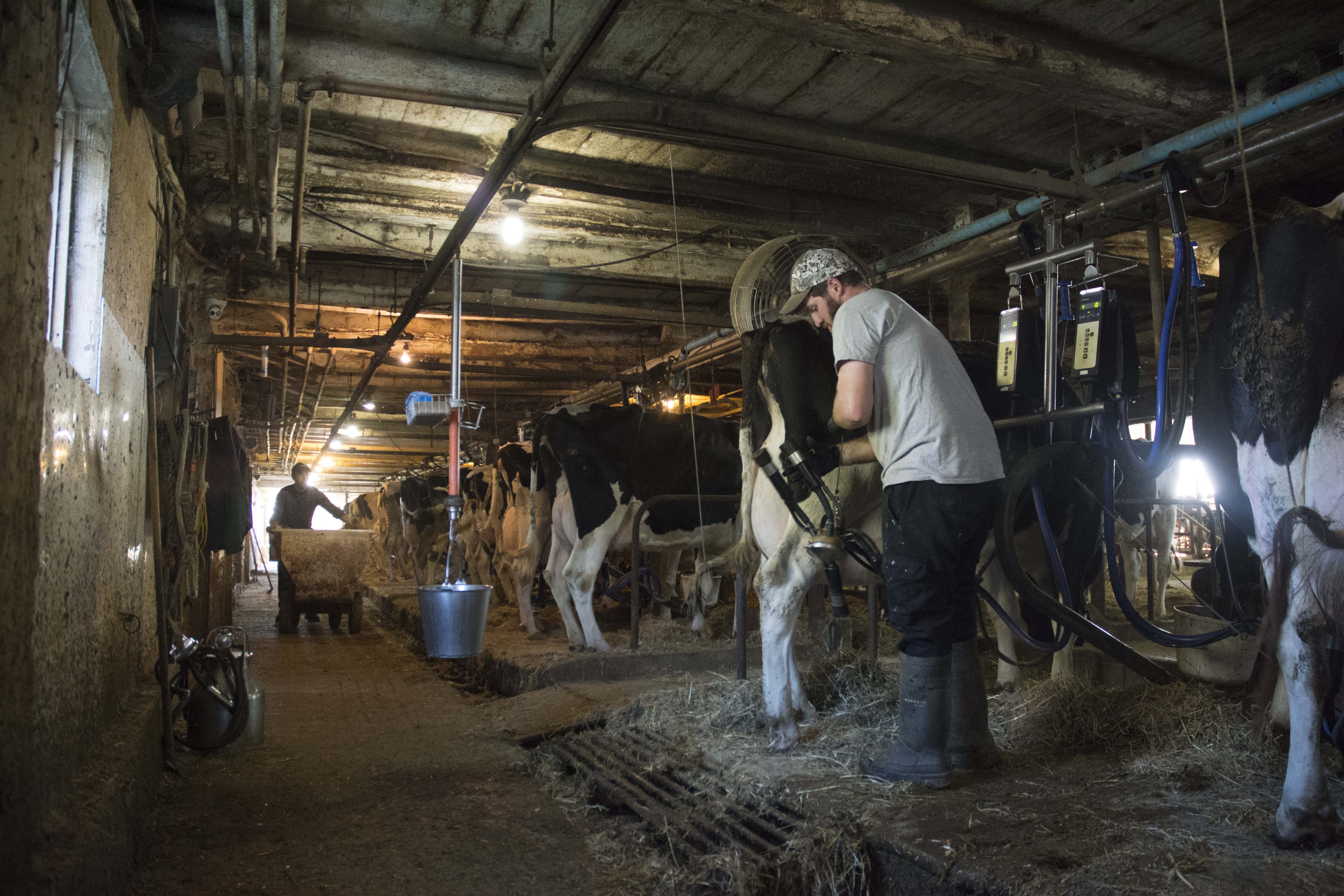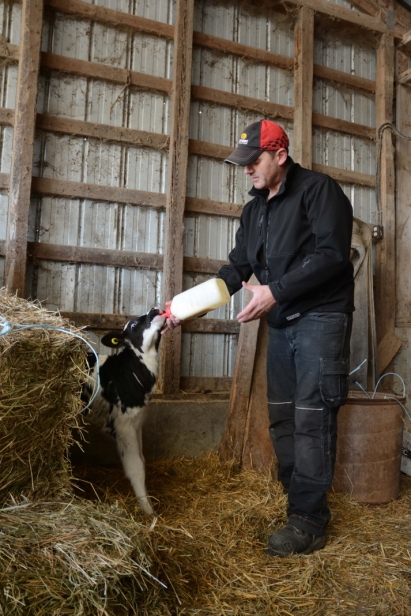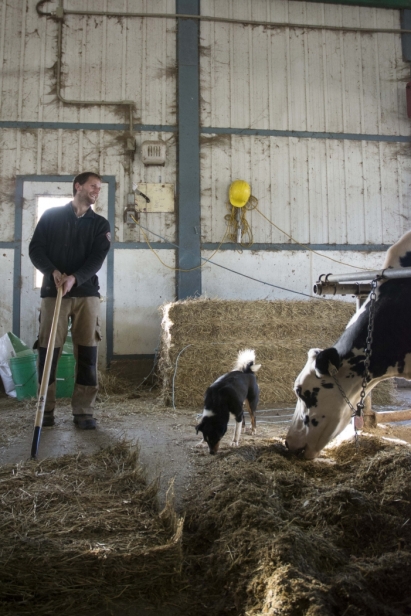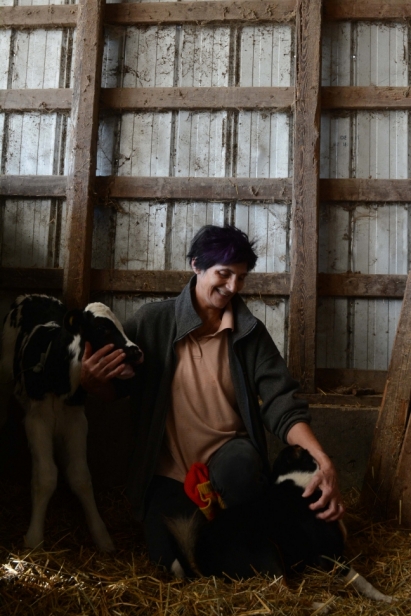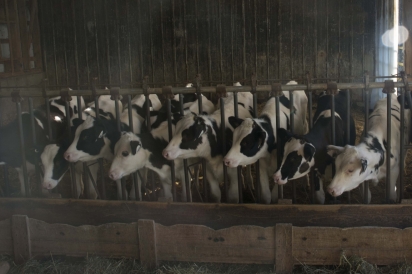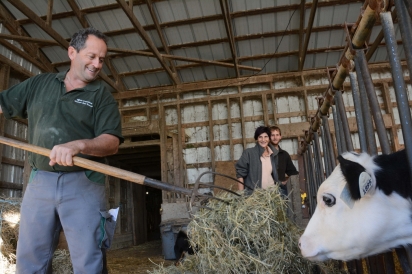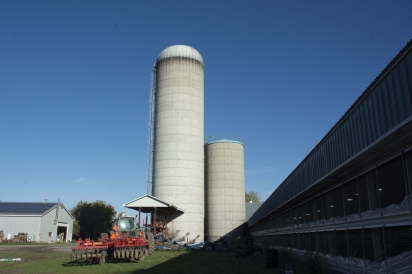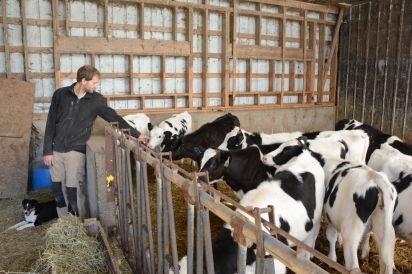Family Co-operative
Lucky, the St. Albert Cheese Co-op. To be 123 years old, back from a near-death experience and still feeding life into an appreciative community must be about as good a fate as one finds in human affairs — and the co-op, an economic anchor to its town, seems good for decades more of vibrant life.
“What we have is a family affair,” says Eric Léveillé, the co-op’s director of business development. “And as a family, nothing was ever more important to us than our longevity, our collective life — and part of everything we do is an attempt to keep this good thing going.”
The St. Albert Cheese Co-op is one of the oldest co-operatives in the country. Founded modestly in this small town on the South Nation River, 10 kilometres southwest of Casselman, in 1894 — six years before the more famous Desjardins co-operative movement began — it has grown from the original 10 partners to the current 32 families that have shares commensurate with their production of milk.
Founding the co-op was both natural and necessary — natural because many of the Francophones who first moved into the area had a long history of raising dairy cattle, and necessary because, in the days before refrigeration, producers had to turn their milk into cheese if it was to achieve any shelf life. Moreover, the flat terrain of the region was ideal for raising dairy cattle.
And you might be surprised at how many cows there are, Léveillé says. “In this area, we have 12,000 cows and 600 people, give or take. Do the math and you get 20 cows per person — most of them Holsteins, but with a smattering of Jerseys and Swiss Browns.”
The co-op’s near-death experience came in February of 2013 when an overwhelming fire completely destroyed the property. Members had to decide if this was the end of the story, or a hiccup that would merely interrupt a century-long bond between the co-op and the community.
On the day after the fire, Léveillé was not yet on staff — but he’s heard many times about the collective decision taken the next day. “If we had been a private company, we could easily have decided to collect the insurance and move on, but no one wanted to do that. We had to rebuild. The members had too much invested financially and emotionally to simply let things die.”
And they would go big. The new factory, which opened two years later after an expenditure of more than $30 million, was, at 75,000 square feet, 30 per cent larger than the original and had triple the annual production capacity. And there were still 150 employees, the same as before the fire, most working in St. Albert, but a few employed at satellite cheese shops in Orléans and in St.Jérôme, Qué.
The cheese, always celebrated, was as good as ever. In fact, some months after the fire, the co-op won the Grand Champion title at the 86th British Empire Cheese Show, an Ontario-based event despite its name, which judges artisanal cheese from scores of Central Canadian producers.
“The quality won’t go down,” Léveillé says. “We may be one of the bigger regional companies for cheddar, but we’re still working the curd by hand, still using the old cultures, still using the century-old recipes and by conscious decision not mechanizing everything — all to keep the cheese great and keep people employed.
“That’s the difference between a co-op and a corporation. We opt for human power and not, exclusively, the bottom line.”
Léveillé has no precise figures on the economic contribution the coop makes to the town of St. Albert, but it’s substantial. “Certainly, it would be in the many millions of dollars annually,” he says. “Processing 50 million litres of milk each year brings in a lot of money.”
The co-op takes care to spend as much of its money in the community as possible. “We believe in supporting the local community like they have always supported us.”
Wherever possible, the co-op uses local suppliers. The co-op’s restaurant, for example, buys only local potatoes. The co-op’s fleet of trucks are serviced locally. Repairs are done by local tradesman.
“Any time we can use a local source, we do.”
The co-op has also given itself the mandate of supporting Franco- Ontarian culture. To that end, it supports Franco-Ontarian music festivals and school programs, sometimes with cash and sometimes with cheese products for consumption at public events. Its donations easily total several hundred thousands of dollars each year, Léveillé says.
The current generation of farmers is finding it difficult to bring its own children into the world of agriculture, but this is not as true for dairy farmers, Léveillé says. “It’s a little different when you’re speaking of a dairy farm with a dairy quota. That guarantees a kind of stable income, making dairy farms more appealing to the younger generation deciding what they’re going to do with their lives.”
For Gerald Benoit, there’s no doubt who will take over the farm once he retires. “My two sons will take over,” he says. “That will make the fourth generation of the family in the co-op.”
The relatively benign financial prospects are of course part of what appeals to his sons, but there’s more. “We believe in co-operatism,” Benoit says. “In the co-op, we enjoy a kind of brotherhood, a real community that brings together the members, the staff and the executive. We are proud of our origins and history, proud of the wonderful cheese we make, and as Franco-Ontarians, we just want to help one another.”
The feeling of family extends to the larger community, Benoit says. “When we were rebuilding after the fire, we had wonderful support from local business, from the schools, from sports groups.”
There is, finally, something satisfactory about the whole process running from producing milk to selling cheese. “On our farms, we produce the milk; we process the milk into our famous cheese; and we sell that cheese to the people who love it.” No single aspect of the process could ever be that satisfying, Benoit says. “We complete the circle, from beginning to finish. It’s all us, working together. You get a good feeling from that.”
Michel Courville is a relative newcomer to the co-op, a member only since 2012, shortly before the fire. “I’m the first in my family to belong,” he says.
Like Benoit, Courville expects his two sons to take over the farm once he retires, though retirement, at the moment, is far from his thoughts.
“But when they step in, they will have lots of advantages,” he says. “At the time of the fire, you could feel the tremendous will to rebuild. The members all had the same goal — to keep something alive that has had a real impact on the members and on the community over several generations. That’s a good group to join.”
Membership in the co-op has a social club aspect, Courville says. “A few times each year, especially at Christmas, we have get-togethers. Beyond that, there’s the general meeting in the spring, and I, as a member of the board of directors, come to meetings once a month. It’s not all about business. People have friendships.”
No future is guaranteed, of course. Léveillé says the membership has some worries about the current negotiations between Canada, the United States and Mexico on the North American Free Trade Agreement. American President, Donald Trump has at times expressed exasperation with the relatively closed Canadian dairy market.
“Of course, this worries us, but we don’t know what will be negotiated. All we can do for now is keep an eye on it.
“We do know that if all tariffs are removed on American cheese, we will be in a bad spot. American cheddar, for example, is almost half the price of Canadian.”
Of more immediate concern is the Canada-European Union Comprehensive Economic and Trade Agreement (CETA), which was signed a year ago and came into force on Sept. 21, 2017. Beyond removing almost all tariffs on a very broad range of goods between the EU and Canada, CETA will greatly increase the quotas on duty-free European cheeses coming into Canada, a measure expected to particularly affect the fine-cheese market.
“This certainly has a direct impact on us,” Léveillé says. “We’re going to see more low-priced imported cheeses than ever before, perhaps twice as many — and this will be difficult for Canadian dairy.”
He doesn’t see any immediate prospects of foreign milk flowing into Canada. “If that happens, it will be very far down the road.” The immediate concern is cheese. But he's not terribly worried about it. “People will go for a cheaper product — but they like quality, too, and that’s where our customer loyalty comes in. People in eastern Ontario right over to Kingston have always been very faithful to St. Albert cheese. I think we can count on their continuing support.”
The new factory is open for visitors. There’s a walkway above the factory floor where you can see the processes that turn 10 litres of milk into one litre of cheese. (That can represent a lot of cheese, given the 50 million litres of milk processed annually.) There’s also a retail store where you can buy not only cheeses, but other locally made products. The restaurant, a Mecca for poutine aficionados, offers many cheese-based dishes at reasonable prices.
In its age, in the enthusiasm of its members, in the quality of its products, in its contribution to the community, the co-op seems to be doing something right. Of course, it has lived for a long time in a tariff- and quota-protected bubble. If globalizing forces burst that bubble, can it continue to thrive? Its members seem to think so.
We never know the future, but the co-op’s resilience and will to live have been on display from its genesis. Nothing guaranteed, but no wise punter would bet against the St. Albert Cheese Co-op.
St. Albert Cheese Co-op
150 St. Paul St., St. Albert, Ont.
fromagestalbert.com, 613.987.2872


